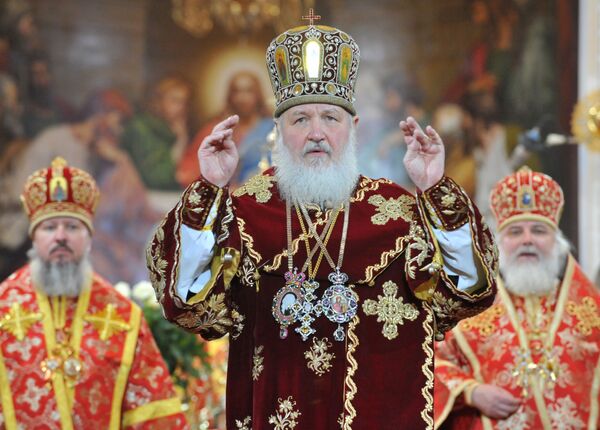Russia is celebrating Easter, the most important and joyful feast for Christians, when the Church commemorates the Resurrection of Jesus Christ.
Patriarch Kirill of Moscow and All Russia, who heads the Russian Orthodox Church, led the Easter service in downtown Moscow's Christ the Savior Cathedral. Some 5,000 people, including President Dmitry Medvedev and Prime Minister Vladimir Putin, attended the service.
"Let the joy of this bright Paschal night that has touched our hearts stay as long as we can hold it," Kirill said following the four-hour service.
After midnight and for the next 40 days after Easter Sunday, Orthodox Christians greet each other with "Christ is risen!" and the reply is "He is risen indeed!" followed by three kisses. They also exchange Easter eggs.
The Resurrection of the Savior, which this year is commemorated by the Eastern Orthodox, Catholic and Protestant churches on the same day, symbolizes the victory over sin and death and the birth of a new world redeemed by his Passion. Easter sometimes falls on the same day although the churches use different calendars.
Preparation for Easter celebrations begins in the Russian Orthodox Church on Holy Saturday — the last day of Holy Week, also known in Russia as Passion Week. Throughout the day, people flock to churches in great numbers to have paschal cakes and eggs blessed by priests.
The Easter divine service starts an hour before midnight. It culminates in a grand midnight procession with crosses and icons that is often also attended by nonbelievers attracted by its splendor. The service lasts into the early hours of Sunday.
Easter is preceded by a long period of fasting. The fasting period before Easter in Eastern Christianity lasts 48 days. The first 40 days of the period are called Great Lent, symbolizing Jesus spending 40 days in the wilderness before being tempted by Satan. In the Orthodox tradition, all days are included into the day count.
The 40 days are followed by Lazarus Saturday, commemorating Jesus raising Lazarus of Bethany from the dead, and Palm Sunday, when Jesus entered Jerusalem, and then by Holy Week, the last week of the fasting period. Holy Week lasts until Easter Sunday but does not include it.
During those 48 days, believers in particular abstain from meat, fish, eggs and dairy products. But the true purpose of fasting is not abstention from these products by itself. Fasting helps people cleanse their souls of sin and learn to fight bad habits and dark thoughts, as well as to control their desires. In this way believers prepare, through prayer and fasting, for Easter.
In Western Christianity, days are counted differently. The fasting period starts not on Monday but on Wednesday, called Ash Wednesday (this year it fell on February 17). The fasting period is called not Great Lent but Lent, and Sundays are not included in the count. This way of counting makes the number of days from the start of the fast until its end exactly forty.
Some significant days of Holy Week include Holy Thursday and Holy Friday. On Holy Thursday, also known as Clean Thursday in Russia and Maundy Thursday in Britain, the Church remembers the Last Supper of Jesus and the Apostles. On that day, bishops wash the feet of priests in commemoration of Christ washing the feet of his 12 disciples as a sign of humility.
Great and Holy Friday, also known as Good Friday, is considered the most sorrowful day of Holy Week and of the liturgical year because Christians remember Jesus being crucified and accepting his death on the cross to save people from sin.
According to the New Testament, Christ was resurrected on the third day after being crucified, which is on Sunday if Friday is included in the day count.
The Gospel of St. John says: "For God so loved the world, that he gave his only begotten Son, that whosoever believeth in him should not perish, but have everlasting life."
There is no liturgy in Christian churches on Holy Friday. In Orthodox Christianity, an icon or embroidery of the Shroud is taken out of the chancel in the afternoon and placed in the middle of the church, with believers remembering the Passion of Christ; the Shroud stays in the middle of the church until the beginning of Sunday's Easter liturgy.
A group of pilgrims delivered on Saturday evening the Holy Fire from Jerusalem to the central Russian cathedral. The Holy Fire that is lit every year at the Church of the Holy Sepulcher in Jerusalem on the day preceding Orthodox Easter is believed by Orthodox Christians to be a miracle.
From Moscow the Holy Fire, which pilgrims say does not burn in the first minutes after it has been lit, is "distributed" among churches in containers similar to those used to transport the Olympic flame.
Russia's other Easter traditions include painting and coloring eggs — normally red as a symbol of the blood of Christ — and cracking them on Sunday. The tradition of giving paschal eggs dates back to the first century A.D.
Church legend has it that Mary Magdalene came to Roman Emperor Tiberius with a preaching of faith and presented him with an ordinary chicken egg. Tiberius did not believe her story of the resurrected Christ and said: "How can anyone be risen from the dead? This is as impossible as if this egg became red now." And the egg turned red, showing the emperor the truth of the Christian faith.
Many Russians on Easter Sunday visit the graves of loved ones, a tradition not welcomed by the Church, which has special days to commemorate the dead and says Easter is a time of joy rather than sad reflection.
MOSCOW, April 4 (RIA Novosti)




